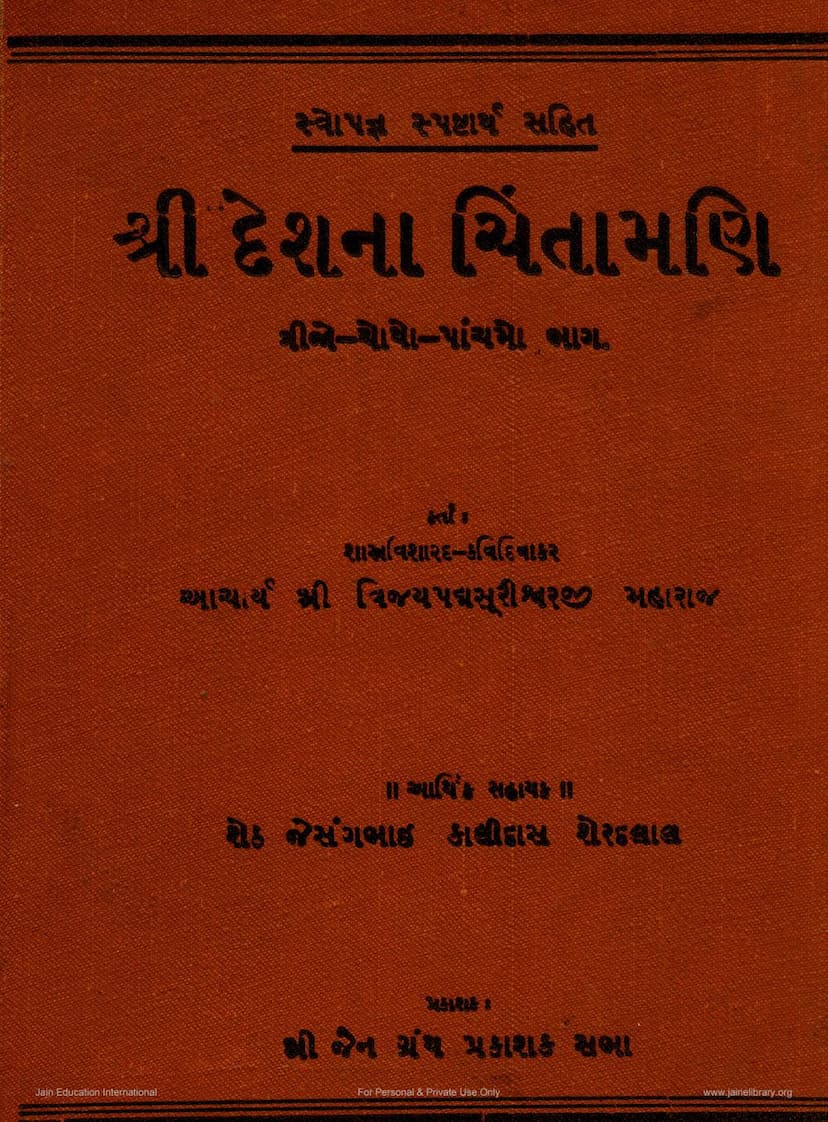Deshna Chintamani Part 03 04 05
Added to library: September 1, 2025

Summary
Here's a summary of the Jain text "Deshna Chintamani Part 03, 04, 05" by Acharya Shri Vijaypadmsuri, based on the provided pages:
Overall Context:
The text is part of a larger work called "Deshna Chintamani," authored by Acharya Shri Vijaypadmsuri. The catalog link suggests it's published by Jain Granth Prakashak Sabha. The text is presented as teachings or discourses ("Deshna") and the specific volumes (03, 04, 05) focus on the teachings of three Tirthankaras: Shri Sambhavanath, Shri Abhinandan Swami, and Shri Sumatinath. The author, Acharya Shri Vijaypadmsuri, is a scholar and poet, deeply devoted to Jainism. He dedicates these volumes to his revered Guru, Acharya Shri Vriddhivijayji (Shri Vriddhichandji) Maharaj, highlighting his spiritual journey, erudition, and the positive impact of his teachings.
Key Themes and Content:
The provided pages offer a glimpse into the devotional and philosophical content of these volumes.
-
Devotional Dedication (Pages 1-2, 8): The initial pages express profound devotion to the author's Guru, Acharya Shri Vriddhivijayji Maharaj. It details the Guru's birth, his early renunciation of worldly life, his acceptance of initiation at a young age, his extensive study of Jain principles, his literary contributions (including works on logic, grammar, etc.), and his impact on guiding people to the right path. The author expresses his gratitude for the spiritual guidance received, which enabled him to compile this important scripture. He prays for continued opportunities to serve Jainism, maintain a virtuous life, and benefit others.
-
Spiritual Teachings (Pages 3 onwards): The core of the text comprises the discourses of the Tirthankaras, presented in a poetic, scholarly, and accessible Gujarati style.
-
Page 3: "Atmashiksha-Shatakam" (Eight verses on Self-Education): This section, authored by Acharya Shri Vijaypadmsuri himself, seems to be a prelude or introduction to the main teachings. It likely touches upon the value of human life, the pursuit of righteousness, the fleeting nature of worldly pleasures, and the importance of self-realization, all within the Jain framework. The verses are in Arya meter and speak of gaining the human form through merit, the significance of virtuous conduct, and the ultimate goal of achieving liberation.
-
Pages 9-13: Summary of Shri Sambhavanath's Teachings (Volume 3): This section provides a detailed overview of the third Tirthankara, Shri Sambhavanath's, life and teachings. It recounts his past lives, emphasizing the importance of good deeds like charity, the virtues of kingship, the hardships of famine and the need for Sangha protection, the reverence for monks and nuns, and the ultimate path to liberation. It highlights the significance of the Vishsthanak Tap (a specific spiritual practice) in achieving Jinanam Karma (karma that leads to Tirthankara status). The summary also touches upon the Tirthankara's celestial journey after death, his birth, childhood, marriage, renunciation, and attainment of Kevaljnana (omniscience).
-
Pages 13-17: Teachings of Shri Abhinandan Swami (Volume 4): This part focuses on the fourth Tirthankara, Shri Abhinandan Swami. It details his previous lives, including his existence as King Mahabal who achieved Samyakattva (right faith) and performed virtuous deeds. The text covers his conception, birth (including auspicious dreams), naming, childhood, youth, marriage, reign, and eventual renunciation. It also describes his spiritual practices, attainment of Kevaljnana, and his sermons, which include profound teachings on impermanence, the value of human life, the consequences of actions, and the path to salvation.
-
Pages 17-29: Teachings of Shri Sumatinath (Volume 5): This section covers the fifth Tirthankara, Shri Sumatinath. It follows a similar pattern, recounting his past lives, the events leading to his birth, his ascensions to celestial realms, and his final life as a Tirthankara. The detailed summaries within the text, such as the explanation of the "Eight Virtues" and the "Twelve Bhavanas" (contemplations), highlight the practical and philosophical aspects of Jainism. The importance of devotion to the Sangha (Jain community) and the spiritual benefits derived from it are also emphasized.
-
-
Generous Patronage (Pages 4, 6, 7, 30-35): The text mentions and acknowledges the significant financial support provided by Seth Jesinghbhai Kalidas Sherdallal Charitable Trust, and Seth Ishwardas Mulchand of Ahmedabad. This indicates the philanthropic spirit behind the publication and dissemination of these Jain scriptures.
-
Author's Intent: Acharya Shri Vijaypadmsuri expresses a desire to make these teachings accessible to a wider audience, particularly to children, by presenting them in simple Gujarati. He also acknowledges that due to financial constraints, some explanations might be brief but expresses hope for future expansion.
-
Content of Teachings: Across the volumes, the discourses delve into core Jain principles:
- Dharma and Spiritual Practice: Emphasis on the preciousness of human birth, the pursuit of virtuous conduct, renunciation, meditation, and the path to liberation.
- Karma and Rebirth: The law of karma, the consequences of actions, and the cycle of birth and death are likely discussed.
- Moral and Ethical Values: Virtues like compassion, truthfulness, non-violence, contentment, and respect for elders are probably highlighted.
- Tirthankara Lives: The detailed recounting of the Tirthankaras' lives serves as exemplary narratives for spiritual aspirants.
- Scholarly and Poetic Elements: The author's expertise in literature is evident in the poetic descriptions and philosophical depth of the teachings.
In essence, these volumes of "Deshna Chintamani" are intended to provide profound spiritual guidance and ethical instruction based on the teachings of the Tirthankaras, making them a valuable resource for Jain followers seeking spiritual upliftment and knowledge.